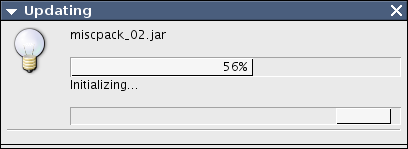More documentation, especially about download speed throttling is coming soon!
You need the following to use JZIPUpdate:
JZIPUpdate can be used both as stand-alone application from a command line*, and
of course programmatically from your own code.
*The current stand-alone application always creates a UI progress dialog,
so it's currently not possible to run in a pure text-based environment like
terminals.
For JZIPUpdate to be able to download just the ZIP entries that have changed, you need to create an index file whenever you deploy a new ZIP/JAR file on your website. The index files are generated by a utility application included with JZIPUpdate and are quite small.
To generate an index file manually (replace the x.y by the actual
version you're using) run:
java -cp jzipupdate-x.y.jar de.vxart.zipupdate.Indexer archive.zip
and to index all ZIP and JAR files in a directory:
java -cp jzipupdate-x.y.jar de.vxart.zipupdate.Indexer /some-directory-with-ZIP-files/
This will generate a file named archive.zip.idx in the same
directory as the original archive. The index file needs to be in the same
directory on your web server as the actual archive.
Updating a single ZIP file:
import java.util.zip.ZipFile;
import de.vxart.zipupdate.UpdateEngine;
import de.vxart.zipupdate.UpdateLocation;
...
ZipFile archive = new ZipFile(...);
URL url = new URL("http://www.example.com/files/bar.zip");
UpdateEngine engine = new UpdateEngine();
engine.update(archive, new UpdateLocation(url));
Updating multiple ZIP files:
import java.util.zip.ZipFile;
import de.vxart.zipupdate.UpdateEngine;
import de.vxart.zipupdate.UpdateLocation;
...
ZipFile[] archives = ...;
UpdateLocation[] locations = ...;
String[] messages = ...; // file names do well as detail messages
UpdateEngine engine = new UpdateEngine();
engine.update(archives, locations, messages);
Updating a single archive (replace the x.y by the actual version
you're using):
java -cp jzipupdate-x.y.jar de.vxart.zipupdate.UpdateEngine archive.zip http://www.example.com/files/bar.zip
or for multiple archives:
java -cp jzipupdate-x.y.jar de.vxart.zipupdate.UpdateEngine /some-directory-with-ZIP-files/ http://www.example.com/files/
Note that when updating multiple files from the command line, you specify a
directory containing archives rather than a list of archives, and you provide a
"base URL" to which the name of any archive found in the directory
will be appended.
For example, when the directory contains monkey.zip and
banana.jar, JZIPUpdate will update from
http://www.example.com/files/monkey.zip and
http://www.example.com/files/banana.jar respectively.
You probably want to notify your users of the status and progress of running
updates, and that's easy to do with the ProgressListener interface.
You can choose between two standard progress dialogs based on Swing or implement
the ProgressListener interface yourself.
For updating a single archive, de.vxart.zipupdate.ui.ProgressDialog
conveniently displays a dialog with a progress bar, download speed, and
estimated remaining time for the update process:

When updating multiple archives at once, you can use
de.vxart.zipupdate.ui.MultiProgressDialog which adds an overall
progress bar to the single-update dialog:

Both standard progress dialogs are easily instantiated and registered to an
instance of de.vxart.zipupdate.UpdateEngine:
UpdateEngine engine = new UpdateEngine();
engine.addProgressListener(new ProgressDialog());
engine.update(archive, location);
And for a multi-update dialog, you just do:
UpdateEngine engine = new UpdateEngine();
engine.addProgressListener(new MultiProgressDialog());
engine.update(archives, location, messages);
Likewise, to remove a ProgressListener you call
engine.removeProgressListener(ProgressListener listener).
You can artifically slow down the speed at which data is transferred from the
web server by setting the System property
de.vxart.zipupdate.UpdateLocation.downloadSpeed to the maximum
number of KBytes per second (1024 bytes/second) that should be used by any
individual UpdateLocation instance, i.e. each instance will use
that maximum speed, it is not "shared".
The value is parsed upon creation of a new instance of
UpdateLocation, it cannot be changed after creation or when a
download is in progress. Legal values are positive numbers, anything else will
disable throttling.
Throttling is considered experimental and the connection might hang randomly. Use at your own risk.
When manually running an update, you can enable throttling by adding the
following argument to your java command:
-Dde.vxart.zipupdate.UpdateLocation.downloadSpeed=200
To enable throttling from code, do this:
System.setProperty("de.vxart.zipupdate.UpdateLocation.downloadSpeed", new Long(200));
Both examples limit the download speed to a maximum of 200 KBytes per second.